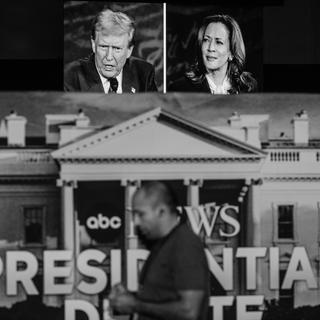


US elections: Kamala Harris and Donald Trump's clashing worldviews
News analysisOn November 5, Americans will head to the polls to decide on the future of their country. They will also be weighing in on US foreign policy, a deeply polarizing issue between Democrats and Republicans.
It's no surprise that American voters focus primarily on domestic issues when choosing their president. In the fall of 2024, inflation, abortion rights, the immigration crisis and the preservation of democracy are hot topics. Foreign policy, while still relevant, has taken a back seat, although the wars in Ukraine, Gaza and now Lebanon have influenced the campaign.
However, the line between domestic and foreign issues is increasingly blurred. Joe Biden underlined this in his first foreign policy speech, in February 2021: "There’s no longer a bright line between foreign and domestic policy. Every action we take in our conduct abroad, we must take with American working families in mind. Advancing a foreign policy for the middle class demands urgent focus on our domestic economic renewal." Defending American jobs, rejecting the free trade agreements of the 1990s and avoiding new wars have become a bipartisan consensus in Washington, with each side interpreting these ideas differently.
The contrast between Donald Trump and Kamala Harris in this respect is striking. The November 5 presidential election is also a referendum on the United States' role in the world. It is a vote on American values and interests, a choice between traditional multilateralism and a vision of a chaotic world, a jungle where Washington should favor relations of force over cooperation.
According to Charles Kupchan, professor of international relations and expert at the Council on Foreign Relations think-tank, this election is the most important in modern American history. "The political center of liberal democracies is in trouble, whether it's here in the United States, France, Germany, Italy or Brazil. If Trump wins, it would send a very worrying signal about the future of ideological moderation in the Western world," he said. In the US, Kupchan added, foreign policy has become a highly polarized issue between Democrats and Republicans. The latter, now dominated by the MAGA (Make America Great Again) movement, is no longer "an internationalist party."
Foreign policy is discussed without nuance to discredit opponents. Candidates accuse each other of weakness but define the term differently. Trump criticizes the chaotic withdrawal from Afghanistan in 2021, saying it shows the Biden-Harris administration's contempt for America's reputation and soldiers. In contrast, Harris focuses on Trump's greed and narcissism, arguing that it makes him easy prey for America's enemies.
These accusations of weakness are often linked to domestic politics. Republicans are counting on the frustration of Arab-Muslim communities in Wisconsin and Michigan, who see the Biden administration as pro-Israel, to deprive Harris of crucial votes. They also criticize aid to Ukraine, which they oppose to what they see as the Democrats' abandonment of the US-Mexico border. In a debate with Trump on September 10, Harris mentioned the Polish minority in Pennsylvania, a key state, when criticizing Trump's leniency toward Vladimir Putin. He'd "eat you for lunch," she told Trump.
You have 83.43% of this article left to read. The rest is for subscribers only.
